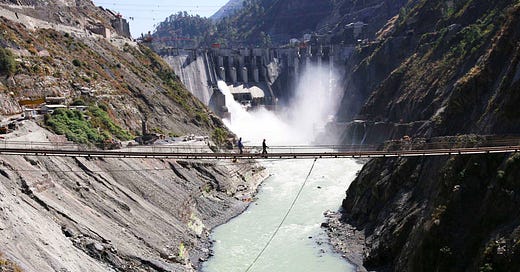Welcome to the Brown History Newsletter. If you’re enjoying this labor of love, please do consider becoming a paid subscriber. Your contribution would help pay the writers and illustrators and support this weekly publication. If you like to submit a writing piece, please send me a pitch by email at brownhistory1947@gmail.com.
Don’t forget to check out our SHOP and our Podcast.

Recommended Reads:
“I Fear There Will Be War”
The Indus Waters Treaty once symbolized uneasy cooperation. Now, its suspension raises the specter of war.
I fear there will be war.
From a continent away, I think of my parents' house. My family lives in a large city near the border. In 2019, our city announced a blackout in anticipation of a possible airstrike. I remember looking up at the stars, made visible by the absence of light pollution, and thinking about my mother’s house. It is made of red bricks. The stairs are lined with portraits of elders staring out in sepia, mustachioed, and turbaned. In a series of wedding photos, women with long dark plaits glint in gold and the jewel tones of silk, banarasi, and kimkhwab. I imagine how these faces would look lying in rubble—ghostly echoes of the ruin that befell our ancestors almost 78 years ago during Partition.
For the first time since its inception in 1960, India has announced a suspension of the Indus Waters Treaty. On the other side of the border, where I am from, fellow Pakistanis hold their breath—and churn out memes, cutting the tension with humor that ironically reflects classic Desi meme culture, shared across Indian and Pakistani lines. Keyboard warriors joke about finally visiting the Taj Mahal or meeting Bollywood celebrities in a surreal, idealized picture of what collapsed borders might look like. I could get behind this, if it weren’t a facade obscuring the violence already unfolding: a massacre in Pahalgam, people being repatriated based on nationality—often at the expense of familial bonds—an intensified media frenzy, and military crackdowns.
This essay is an emotion-oriented and mnemonic response to the bloodlust dominating the mediascape. Emotions are political, as scholar Sara Ahmed argues. They are shaped by cultural scripts and politically manipulated. This is also an argument for harnessing a politics of emotion towards de-escalation, nonviolence, and justice rooted in cooperation rather than retaliation. I touch upon on entanglements through land and water. I think of Gaza, which remains a heartbreaking lesson in what dehumanization, political othering, and resource acquisition can yield.







